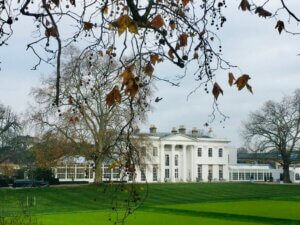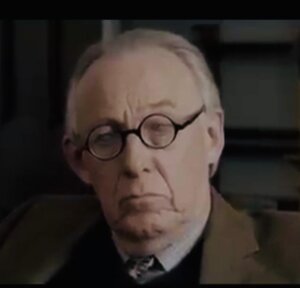
Marion Tijsseling
Formerly owned by John Horsley Palmer (1780-1858), an East India Merchant and Governor of the Bank of England, the building known today as the ‘Hurlingham Club’ has long established connections with India: in the late 1830s Palmer let the house to Richard Wellesley, who had served as Governor-General in India from 1798-1805; in 1873 the club published the rules of polo, which are still followed by most players to this day.
On a crisp, clear January day around 25 BACSA members were joined at this historic Thameside venue by several Club members for an Indian curry lunch, followed by a captivating talk by Martin Bishop, an actor and Club member, on his roles in two very different dramatic productions about Indian Independence and Partition in 1947.
In 2007 Martin joined three other actors (two Indian, one British) in Live 1947, an ambitious outdoor production in Delhi, celebrating the 60th anniversary of Independence. Each actor played several roles; Martin’s medley of ‘British men’ ranging in time from Sir Thomas Roe (1581-1644), ambassador to the Moghul emperor, to Lord Louis Mountbatten (1900-1979). Apart from coping with all the usual thespian nightmares – male costumes minus trousers; darkened sets with missing steps; final pages of the script still to be written – the cast faced several novel technical challenges. The drama had so many changes of set that the audience were seated on a revolve, which rotated as each scene finished. The numerous sets (eg the Viceregal Lodge) were placed on rail transporters and trundled up and down on two parallel tracks laid on either side of the audience. The rigorous timing discipline required to achieve smooth transitions often failed; the actors improvised adeptly to ensure that the negotiators all met at the appropriate times and venues, so that that India could indeed become independent ‘at the stroke of the midnight hour’.

Ten years later, in 2017, Martin acted in This Bloody Line, a short film written and directed by Ram Madvani to commemorate the 70th anniversary of Partition. The film script covers an imagined, and very poignant, conversation between Sir Cyril Radcliffe and his wife, following the publication of W H Auden’s 1966 poem Partition.
Madvani shows how Radcliffe was put under enormous pressure to devise the ‘line’ separating India and Pakistan, within seven weeks. In this very powerful, 9-minute film he is portrayed sympathetically, utterly devastated by the outcome of the ‘bloody line’, which led to the deaths of over 1 million people and the enforced migration of some 12 million. The thought-provoking ending unflinchingly suggests that Radcliffe’s task was well-nigh impossible.

R Raza
Article by Rachel Macgowan
